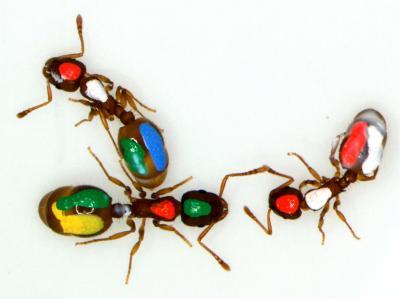Please note: Osher Rainforest will be closed for maintenance Jan. 14–16.
Science News
Ants Galore!
June 3, 2011

We've shared with you the story of rafting ants, but there's so much more to these little insects. We thought we would take recent ant stories and share them with you on this Friday news round-up.
Ants Defending Trees
Did you know that some ants defend their tree homes from invading plants? But how can they tell the difference between the host tree and other plants? Colorado State University scientists decided to find out.
Ants known as Pseudomyrmex triplarinus are found in the Peruvian rainforest and have evolved a symbiotic relationship with Triplaris americana trees, receiving shelter and sustenance in return for defense.
“The ants inhabit hollow channels inside the tree and aggressively fight off any invaders including other plants, yet how these ants recognize their host tree compared to other plants has not been studied,” said lead author Tiffany Weir. “We found that the ants distinguish between their host trees and encroaching species through recognition of the plant's surface waxes.”
Once a competing plant is recognized the ants prune them to defend their host. The research is published in the journal Biotropica.
Would Ants Facebook?
Scientists have assumed for years that interaction networks without central control (think Facebook, Twitter and even the spread of disease) have universal properties that make them efficient at spreading information. Just think of the local grapevine—let something slip, and it seems like no time at all before nearly everyone knows.
But University of Arizona researchers, studying ants, have found that not all of these networks function alike. Their study was published last month in PLoS ONE.
The researchers chose to use ant colonies as models for self-directed networks because they are composed of many individual components—the ants—with no apparent central organization and yet are able to function as a colony.
This research is incredibly detail-oriented. After relocating ant colonies to their lab, the scientists painted each one to identify the individuals. They then filmed the ants, recording roughly 9,000 interactions between 300 to 400 individual ants.
The results were surprising. Contrary to predictions that ant networks would spread information efficiently in the same way as other self-directed networks, the researchers found that the ants actually are inefficient at spreading information.
According to lead author Benjamin Blonder:
They could be just walking around completely randomly bumping into each other. We were able to show that the real ants consistently had rates of information flow that were lower than even that expectation. Not only are they not efficient, they're also slower than random. They're actually avoiding each other.
So this raises a big question: If you have this ant colony that is presumably very good at surviving and persisting, and there are a lot of good reasons to think it's optimal to get messages from one part to the other, how come they don't do it?
One possible explanation is a concept most of us already are familiar with: “If you spend too much time interacting, then you're not actually getting anything done,” said Blonder.
Another possibility is that individual ants are responsible for only their region and only need to communicate with other ants in that region.
So why does all of this matter? Understanding how interaction networks function could have applications from building self-directed networks to perform specific functions (such as unmanned drones to explore other planets) to preventing the spread of disease.
Ant Supermodels
Can we hear some catcalls, please? Go over to the Daily Mail to see what we mean. These gorgeous, hi-res ant images come from Antweb, a project that calls the Academy home and “provides tools for exploring the diversity and identification of ants,” according to the website. The goal is to image all ant species, around 12,000 of ‘em. Check out a few from the nearly 5,000 already on the web.
Image: Benjamin Blonder